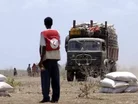A global presence in the delivery of humanitarian aid

The Red Cross is a global humanitarian movement and is an institution of charitable response during incidences of conflict, violence and disasters across the world. Established in 1863, the International Committee of the Red Cross (ICRC) is the umbrella organisation of the national Red Cross relief societies. Collectively, 80 countries across the world are now benefitting from its presence.
The underlining aspect of the Red Cross that makes it unique is the fundamental principles it employs within its movement. Gregory Rose, a health advisor for the British Red Cross, notes these principles as being “neutrality and independence,” meaning the it does not affiliate itself with any religion, military or political force. This allows the Red Cross to maximise its global presence, as Rose explains: “This enables access for movement actors where other organisations may be unable or unwilling to go.”
Among the Red Cross’ many global projects, health is one of its major focuses. Its work in disaster and conflict zones sees it provide victims of such events access to preventative and curative healthcare of internationally recognised standards. Healthcare was also the inspiration behind the Red Crosses’ formation; founder Henry Dunant was appalled by the number of men and women that died due to a lack of care after the Battle of Solferino in 1859.
An increase in the frequency and intensity of natural disasters is one of the major health issues currently affecting global communities. Rose adds that a growing population is also resulting in a lack of access to water, food and fuel. Additionally, he says competition for land is seeing poorer communities being forced to relocate settlements to ‘at risk’ areas such as flood plains, river valleys, conflict zones and environments that are prone to earthquakes or drought. He believes these problems are collectively increasing worldwide health risks and challenges.
“Health should be seen as an outcome rather than an intervention, achieved through a range of interventions,” says Rose. The projects and outcomes that the Red Cross works towards are varied and include: providing health and social care to those living with HIV, TB or other such illnesses, preparing for and trying to reduce the risk of natural disasters as well as facilitating access to shelter, primary healthcare clinics and water and sanitation services.
The Red Cross experiences a number of challenges in providing humanitarian and healthcare aid across the world. Rose notes the main operational challenges the organisation faces are retaining its neutrality and ensuring access for the most in-need where there are hostilities. He elaborates: “Perceptions of the status of the Red Cross are important to ensure that our services are used, since there may be a fear of using health facilities which have a military or political alignment, where reprisals may occur.”
These difficulties are common in conflict zones and can also be experienced in disaster areas, although Rose explains natural disasters can often bring additional complications: “Responding in a disaster for any agency or organisation can be made more difficult if the disaster has damaged the country’s infrastructure. In the Pakistan floods last year, roads were cut off and bridges were completely destroyed, meaning the Red Cross had to come up with more inventive solutions to reach the communities.”
The Red Cross recognises that a prompt reaction is vital when responding to natural disasters and is essential to save lives. In regards to the British Red Cross, Rose explains the methods it employs to ensure a swift response: “We mobilise relief items from one of three warehouses, which are positioned strategically across the globe to allow the items to reach people in need as quickly as possible. This can include tents, water containers, mosquito nets, blankets and any other items people may need in an emergency. In addition, the British Red Cross has a pool of specialist delegates who can be deployed to the field at very short notice, allowing gaps in human resources to be filled and life-saving programmes to be carried out.”
Collectively as an organisation, the various arms of the Red Cross work together to make sure its charitable efforts are effective and valuable to those most in need. “We operate as a movement, sharing resources - financial, materials, people – to achieve the most efficient response where it is most needed,” Rose says. He concludes by saying: “The Red Cross works hard to promote its fundamental principles of impartiality and neutrality, making sure we are there to help anyone in need, regardless of politics, ethnicity, or gender.”
The response of the Red Cross to the Japanese tsunami:
ICRC delegates discuss what it's like working for the Red Cross:



